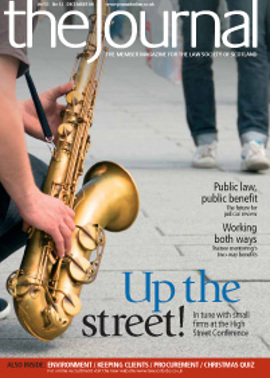Business makeover

The future is about being small, flexible and profitable; and clients need you now more than ever before.
Such words may seem rash when uttered in the depth of an economic recession, with house sales down over 40% on a year ago (Registers of Scotland figures) and no upturn in the economy likely before autumn 2009 or even spring 2010 (Law Society of Scotland collective best estimate). But their author, Malcolm Mackay, speaking at the Society’s High Street Conference on
29 November, was entirely in tune with the panel for the day, whose collective wisdom is perhaps best summed up in Austin Lafferty’s metaphor: the high street profession is not sinking, but like the QE2 it has hit a sandbank and needs to be floated off and pointed in the right direction. It may or may not come as good news, but you probably have as good an idea as anyone as to when the recession
will end. Vice President Ian Smart, whose initiative it was that the Society hold the conference, pointed out that solicitors had been among the first to notice the trend when house transactions suddenly dried up early in the year, while government and academics alike were slow to accept the implications.
Even in June the Fraser of Allander Institute was predicting that growth in Scotland would continue, if at a slower rate. Not so surprising perhaps that no economist accepted the invitation to speak at the event!
Don’t just sit there…
The Lafferty message, in as many words, was, whatever you do, do something. And Mackay was clear that the situation should be used as the catalyst for necessary change. Change is the only constant, he told us, and the credit crunch “is the opportunity for law firms to deal with the approaching tidal wave”. A man whose career has consisted of moving on every time he began to feel comfortable (his own words), he insisted that despite it being the preference of many firms in the past, standing still is no longer an option.
And we have opportunities. Ian Smart had already pointed out that bank regulation is set to become much tighter than had previously been thought necessary, and banks in addition are likely in future to be more risk averse in relation to conducting legal business through ABS (alternative business structure) models such as “Tesco law”. For Mackay, ABS “should be grown out of law firms… The permutations are obvious; the opportunities are everywhere”. There is a huge market, he said, for all-round, trusted advice, and the future of legal services is marketing.
It was Lafferty who put some flesh on the bones in terms of practical actions. The most fundamental tool we have at our disposal, he reminded us, is our client bank. Earlier this year his firm had contacted all clients aged over 50 whose wills were more than three years old. Had their family circumstances changed? Would they like advice on IHT? The firm wouldn’t charge for a review meeting; but the letter also enclosed some notes on powers of attorney and the costs of a guardianship application. The result: hundreds of letters sent out, attracting dozens of replies and enough work on powers of attorney to make it a profitable exercise. (If your database is good enough to let you do it by email, it doesn’t even cost you anything.)
And from his experience of a client who had sufficient legal expenses cover in his domestic insurance policy to pursue litigation against a neighbour who had blocked the client’s gutter, he was planning to write to all domestic property owners and tenants to suggest they might care to review their own cover. “I’m confident we’ll get a good response.”
Shape your own future
Lafferty, who as chair of the Society’s strategy group sees it as part of his mission to build up and promote the brand of solicitor, urged his audience not to turn away work they didn’t fancy if it was within their competence. Another message was to use CPD to add to your skills to help you diversify: “The more you can retool, reskill, the better a lawyer you will be, and when business picks up, you will be better equipped.”
Simpson & Marwick’s Peter Anderson, who spoke on risk management, underlined the dangers of taking on work beyond our competence, but both he and Lafferty advocated referral arrangements for exchanging business with other firms with different skill sets.
It was Mackay who emphasised making the most of the people who work for you. “I can’t be bothered with people who only pay lip service to dealing with people issues,” he said, recalling from his experience of unfair dismissal claims that lawyers were one of the four worst categories of employers. “Word gets round if you treat people badly.” But if you have to realign your business, the recession is the time to do it, because everyone understands why.
It isn’t just technicians you want, it’s people who can do that all-important marketing, he added. Who are your natural marketers? (Not, it would appear, whoever had designed the websites of most of those present – having looked over them before he came, where they existed at all, Mackay thought they did a pretty poor job of promoting what their firms had to offer.)
If there is one word to sum up both Mackay’s and Lafferty’s presentations, it was “action”. “Don’t try and predict the future,” Mackay asserted. “Don’t wait for it to happen. Create it! Make a niche for yourself and it will grow.” Find out what your clients want, and structure your business round that. But beware “analysis paralysis” – spending too much time trying to work out what to do, at the expense of getting on and doing it.
And he seconded Lafferty’s advice: if you are in the doldrums, the only way forward is positive action. Paint the office! Throw out what you don’t need! Freshen up the place! If you renew your physical environment, you renew yourself. Recognising he was turning quite evangelical, Austin added for good measure: “Cast out the Satan of complacency!”
Shoulder to shoulder
From conversation with those attending – the conference attracted nearly 100 solicitors from all over Scotland – the feeling emerged that while times are tough, a practice with a spread of general business, or one not exposed to property work, has a decent chance of pulling through, albeit with a bit of belt tightening. Perhaps also there is now more of a feeling of mutual support and solidarity. Ian Smart indeed, winding up the proceedings, suggested we were now seeing a greater “collegiality” in the profession in terms of sharing experiences and advice, and a willingness to refer business mutually between firms with complementary practice areas.
If so, there is cause to hope for the survival of the high street law firm.
In this issue
- Sale and purchase agreements – how to avoid the unexpected
- 2008: a year of change; 2009: a year for progress
- Law: it's the business
- Business makeover
- Training plus
- Registers update
- Public service
- One of a kind
- Brussels sprouts more eco-law
- Test yourself
- Trainees try again
- Terms of Business Guidance Note (November 2008)
- Guideline: Scanning and Archiving Documents (November 2008)
- Client, or customer?
- The changing faces of fraud
- Business advice roundup
- The year that crunched
- The anatomy of law firm failures
- Chapter and verse
- The power of agreement
- Under a cloud
- Scottish Solicitors' Discipline Tribunal
- ECJ in the fast lane
- Website review
- Book reviews
- Tender trouble
- Opportunity beckons, Smart tells symposium
- Public money or bust?






